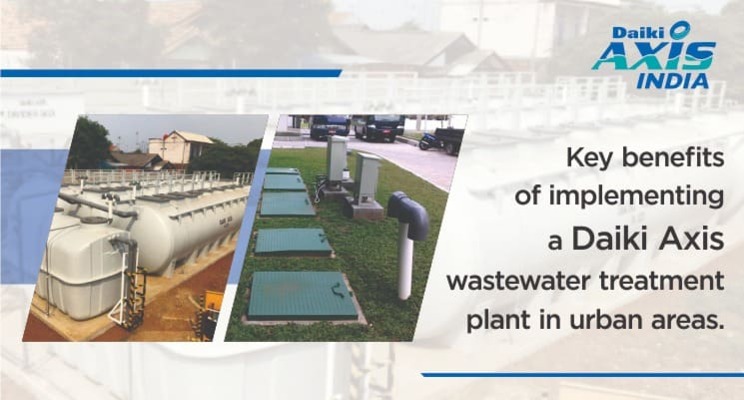A wastewater treatment plant (WWTP) is an essential infrastructure that processes sewage and industrial effluents to remove contaminants. It ensures that the treated water can be safely discharged into the environment or reused for various purposes. The operation of these plants is crucial for maintaining public health, protecting ecosystems, and conserving water resources.
What is wastewater?
- Wastewater: Water affected by human activity from domestic, industrial, and agricultural sources.
- India’s Wastewater Challenge: Large volumes generated daily, with much discharged untreated, causing pollution.
- Consequences: Waterborne diseases, groundwater contamination, and ecosystem disruption.
- Solution: Advanced treatment like Daiki Axis Johkasou, membrane bioreactors (MBRs), and sequencing batch reactors (SBRs) offer high efficiency and adaptability.
Types of Wastewater Treatment Plants
Primary Treatment Plants:
- Removes large solids and debris using physical processes (screening, sedimentation).
- The first stage in wastewater treatment.
Secondary Treatment Plants:
- Uses biological processes to break down organic matter.
- Common methods: Activated sludge process, trickling filters.
Tertiary Treatment Plants:
- Provides further treatment to improve water quality.
- Methods: Filtration, chemical processes (disinfection), advanced oxidation.
Industrial Wastewater Treatment Plants:
- Specializes in treating wastewater from industrial processes.
- Integrates physical, chemical, and biological techniques designed to address specific pollutants.
Decentralized Treatment Plants:
- Small-scale facilities for specific communities or properties.
- Methods: Package plants, constructed wetlands, or compact systems.
Advanced Treatment Plants:
- Utilizes cutting-edge technologies (e.g., membrane bioreactors, reverse osmosis, electrochemical treatment).
- Achieves high-quality effluent and address specific contaminants.
Microplastics in Wastewater Treatment Plants
- Microplastics (MPs) are environmental threats in wastewater.
- MPs removal is most effective during primary treatment, with added efficiency in secondary and tertiary stages.
- Biological methods like activated sludge and biofilm processes achieve 60-90% removal.
- Daiki Axis India’s Johkasou technology uses advanced processes to remove MPs from wastewater.
- Johkasou improves treatment efficiency, reducing microplastic pollution and protecting ecosystems.
The Role of Wastewater Treatment Plants
Wastewater treatment plants are crucial in reducing the environmental impact of wastewater. These plants employ a series of processes to remove contaminants from wastewater before it is discharged into the environment or reused for various purposes. The primary objectives of STPs include:
- Suspended Solids Removal: Processes like sedimentation and filtration effectively separate suspended solids, including silt, organic matter, and debris, from wastewater.
- Biological Treatment: Employs microorganisms to decompose organic pollutants, transforming them into safe byproducts such as carbon dioxide and water.
- Chemical Treatment: Application of chemicals to precipitate or neutralise harmful substances like heavy metals and pathogens.
- Disinfection: Using techniques such as chlorination or ultraviolet (UV) radiation to remove pathogens and ensure the treated wastewater is safe.
Wastewater Reuse
Wastewater reuse, also known as reclaimed water reuse, is a sustainable practice that involves treating wastewater to a quality suitable for various beneficial applications. This approach not only conserves water but also helps mitigate water scarcity challenges.
Uses of Reclaimed Water:
- Agriculture: Reclaimed water is used for irrigation, reducing the demand for freshwater resources.
- Landscaping & Golf Courses: It helps conserve water by supporting non-potable uses in parks and golf courses.
- Industrial Processes: Reclaimed water is applied in cooling systems and other industrial processes, reducing the reliance on freshwater.
- Toilet Flushing: It reduces potable water consumption in buildings, promoting efficient water use.
- Groundwater Recharge: Reclaimed water supports the replenishment of natural groundwater sources, helping to maintain ecological balance.
Benefits:
- Water Conservation: Reduces the need for freshwater, addressing water scarcity issues.
- Sustainability: Encourages responsible water management and reduces environmental stress on natural water sources.
Safety & Quality Assurance:
Proper treatment processes, adherence to quality standards, and regulatory frameworks ensure that reclaimed water is safe for its intended uses.
Environmental Responsibility:
Wastewater reuse promotes sustainable water management practices, helping to protect the environment by reducing pollution and preserving valuable water resources.
Daiki Axis India Leads Innovation in Wastewater Treatment
Daiki Axis India is a pioneer in environmental solutions, particularly in wastewater treatment. The company is committed to sustainability and technological excellence, offering innovative solutions that address the growing need for effective wastewater management.
Johkasou Technology
Johkasou technology, developed in Japan by Daiki Axis, is a compact and highly efficient wastewater treatment system. It integrates physical, biological, and chemical processes to treat various types of wastewater, including domestic sewage, industrial effluents, and agricultural runoff. Johkasou has gained global recognition for its efficiency and versatility in meeting stringent environmental standards.
Key Benefits of Johkasou Technology
- Compact Design: Ideal for both urban and rural settings, requiring minimal space for installation.
- High Treatment Efficiency: Meets regulatory standards using advanced treatment processes.
- Versatility: Suitable for diverse wastewater types, including domestic, industrial, and agricultural.
- Energy Efficiency: Incorporates features that reduce energy consumption, promoting sustainability.
- Ease of Maintenance: Supported by comprehensive maintenance services for optimal performance and longevity.
Conclusion
As we navigate the challenges posed by rapid urbanization, industrial growth, and environmental degradation, wastewater treatment becomes increasingly crucial. Through its advanced technologies and sustainable solutions, Daiki Axis is leading the charge toward a brighter and cleaner future.
Innovations like Johkasou technology and promoting responsible wastewater practices mitigate pollution, protect our water resources, and build resilient communities. The journey towards sustainable wastewater management is a collective endeavour. With concerted efforts, we can unlock a world where wastewater is not a problem but a valuable resource for the planet.
Contact us at https://daikiaxis.in/contact-us/
Read more relevant blogs here: https://daikiaxis.in/blog/
#DaikiAxis #Johkasou #sewage #water #STP #DaikiSTP #WastewaterTreatmentPlant
#PackagedSTP #JohkasouPrice #PackagedSewageTreatmentPlant #STPCompanies #STPPlant #SewageTreatmentPlantinDelhi #SewageTreatmentPlantinIndia #STPPlantManufactures #SewageTreatmentPlantManufacturesinIndia #johkasouSTP

